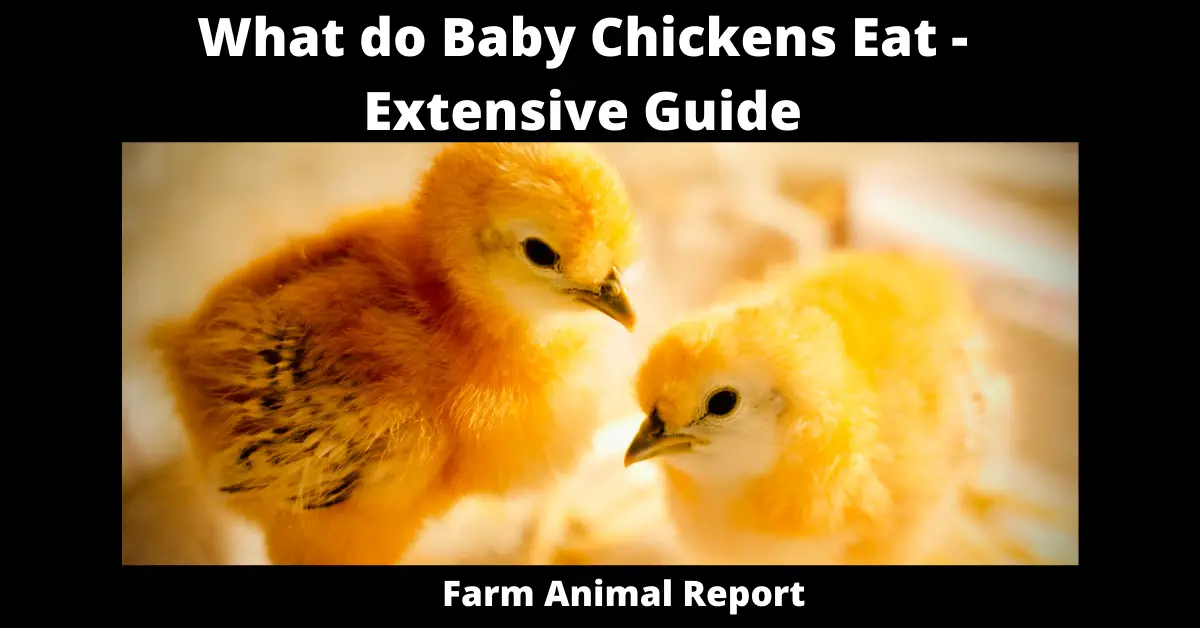- Tiny Bugs / Insects
- Tiny Worms
- Lettuce,
- Beets,
- Broccoli,
- Carrots,
- Kale,
- Swiss Chard,
- Squash,
- Pumpkins,
- Cucumbers
- Lavender
- Mint,
- Oregano,
- Parsley,
- Cilantro,
- Thyme,
- Basil
- Daylilies,
- Hostas,
- Daisies,
- Roses,
- Coneflowers,
What do Baby Chickens Eat – Ultimate Guide
What do Baby Chickens Eat – Baby chicks don’t need to eat or drink for roughly 48 hours after they’ve hatched. Because they are sustained by the yolk of the egg, which they suck into their bodies shortly before breaking through the shell, they are able to survive.
What do Baby Chickens Eat – It’s how hatchery chicks can be shipped by mail with nothing to eat or drink in their container. So don’t be concerned if your chick is still in the incubator without food or drink as she dries up and fluffs up. For the time being, she’ll be alright.
Check Out Amazon for Educational Resources for Breeding Chickens
12 Ways to Make Money by Chicken Farming—Extensive Guidelines for Chicken Farmers
You must purchase the proper nutritional feed for your baby chicks. Please don’t feed them the same food as your adult flock: it’s too high in calcium, which can cause lasting kidney damage, and too low in protein, which chicks require to grow at such a rapid rate.
Chicks grow at an incredible rate in their first few weeks of life, so feeding them well-balanced chick food, also known as “starting feed” or “chick crumb,” is crucial for their healthy development.
Can You Make your own Baby Chick Feed?
Some owners do, and you can also make that in your home. But that feed will be critical for the chick’s development to have a well-balanced meal with the correct amount of protein required and extremely minimal calcium. It’s a tall order to try to offer that for yourself. It’s wiser, in our opinion, to invest in a high-quality feed that you and your chicks can rely on.
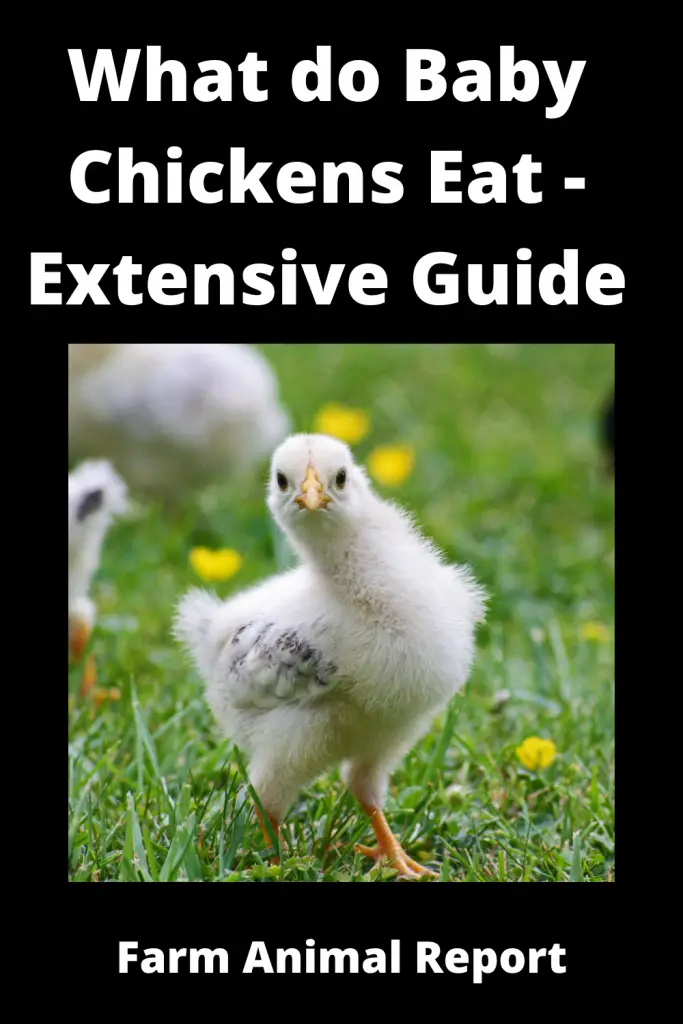
Is it Better to give Medicated Feed or Not?
We’ve never given our chicks pharmaceutical feed, and there’s no need if you keep your hatchlings in a clean brooder, clean away their droppings daily, and make sure they have enough space.
If you buy chicks from a hatchery, make sure they already get their vaccine against coccidiosis. If this is the case, you should not give them any medicinal food. It will not necessarily kill them, but it will render the vaccine ineffective.
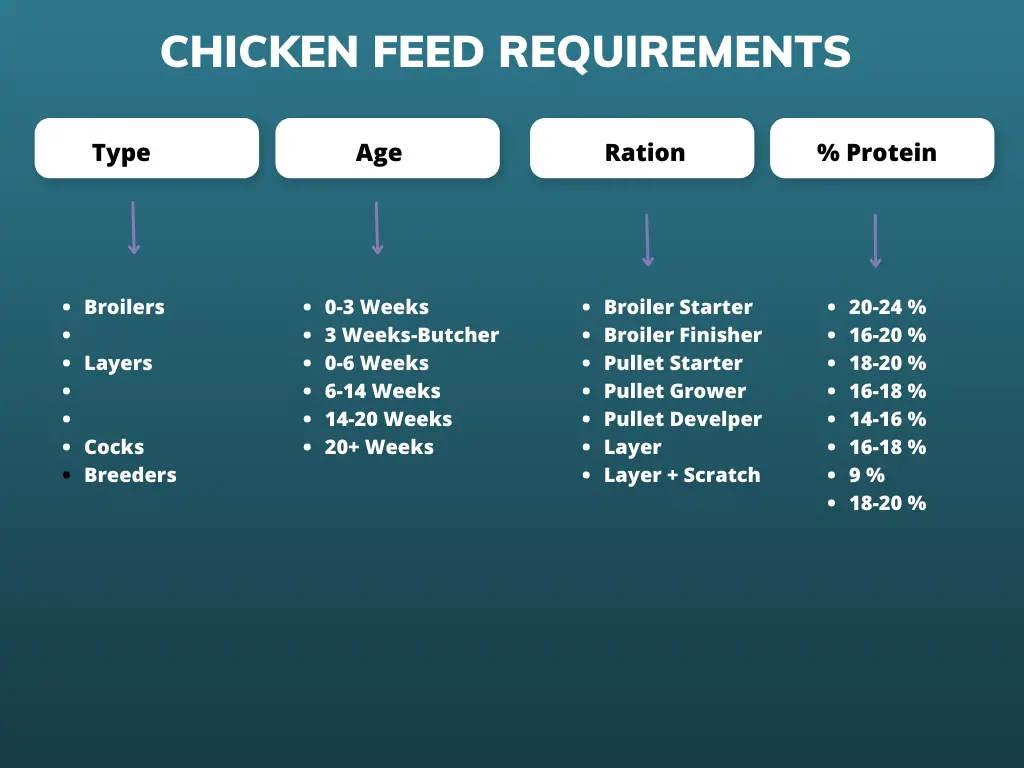
When is it Required to give Medicinal Food to Chicks?
Chicks that are hatched and grown in crowded environments, such as those found on commercial farms, are usually fed medicated feed to avoid illness transmission. If you’re hatching more than 50 chicks at once, a medicated meal may be necessary.
On the other hand, backyard flocks should not require it, especially if you plan to raise your community naturally. Don’t offer your girlfriend medicines “just in case.”
Instead, make sure you have vital husbandry and biosecurity precautions in place. Without chemicals in their system, your flock will be healthy and happy.
When can a Baby Chick Start having Treats?
This is most likely the most often requested question regarding chicks! The answer is that “treats” are given to baby chicks raised by a mother hen from day one. They’re not inside; they’re in the yard with her, eating anything she tells them is healthy!
What do Baby Chicks Eat in the Wild?
Baby chicks in the wild eat a variety of bugs, plants, and even microscopic worms. They become increasingly capable of pursuing other delights, such as frogs and even small mice, as they grow and get stronger. Chickens are omnivores, to be sure. Baby chicks are no exception, but they take it easy and stick to bugs and greens when they’re young unless mama helps them out with a special meaty treat.
What can Baby Chickens Eat Besides Feed?
If chicks aren’t provided chick starter, they’ll need grit (sand) to help them digest it. Because chicks lack teeth, saliva is used to digest chick starter, but other feeds require grit to pulverize in the gizzard.
They should be given chick grit at this age, not adult grit, which is too huge for them. As if you were sprinkling salt on anything, sprinkle the sand on top of their meals. Place it on top of the food rather than in a separate dish to ensure that everyone gets some. Oyster Shell is not the same as grit because it contains too much calcium, leading to organ failure.
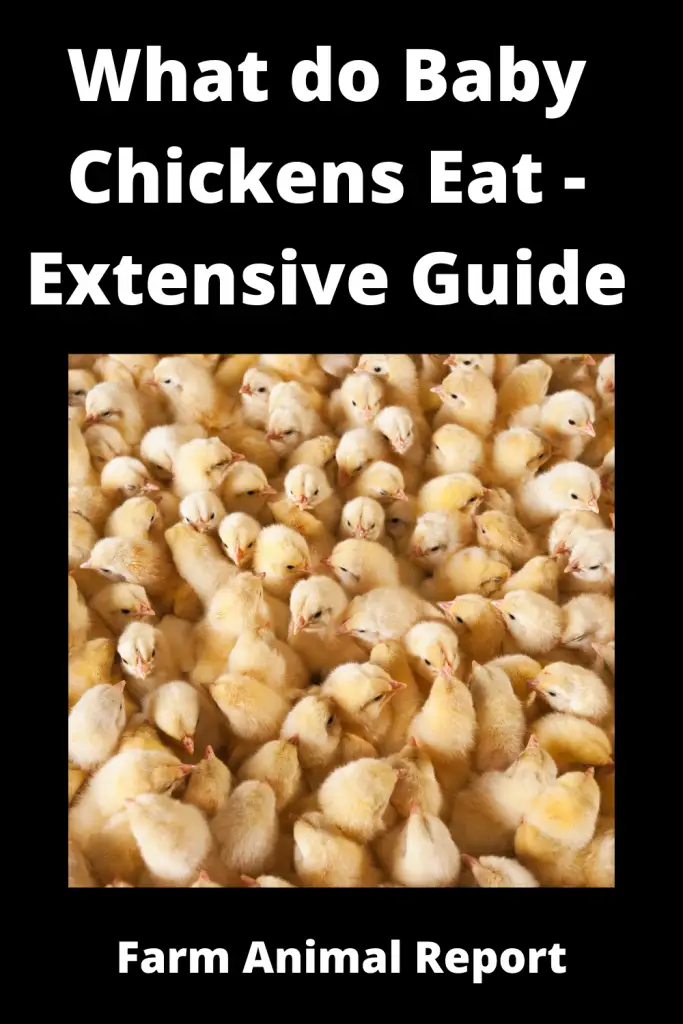
Chicks who enjoy treats are not consuming commercial feed, which should be their primary source of nutrition. Treats should make up only 5-10% of a female’s diet. Anything you add to their diets has the potential to dilute the commercial feed’s nutrition balance. Healthy snacks, too, should be consumed in moderation. Too many goodies can wreak havoc on a chick’s growth and immune system, resulting in nutrition imbalance.
When the chicks are eight weeks old, they can start eating Grower feed.
To begin, combine 50 percent chick starter and 50 percent grower feed in a mixing bowl. Don’t put off using your chick starter until you have more chicks. It will become moldy and dangerous to the chicks. Please make the most of it. It’s fine if they eat it at any stage of growth.
How Much do Baby Chickens Eat?
“How much do my birds eat so I know how much feed to buy?” is a popular question among poultry owners, especially those new to rearing birds.
Below are some general suggestions to follow, but bear in mind that various circumstances, like weather and other available food sources, might influence how much prepared feed your birds consume.
Amounts to Feed Newly Hatched Birds:
• Layer Chicks: In the first ten weeks, each bird should end up weighing 9-10 pounds.
• Broiler Chicks: 8-9 pounds per bird in the first six weeks (based on Cornish Game Birds)
On average, one chick can eat 14-15 grams of feed per day during the first week. This feed intake then increases gradually. Chickens will eat when they are hungry, and they should go to bed with a whole crop since they require a lot of food to lay eggs. A fully grown chicken consumes approximately 120 grams of layers pellets each day.
Keep in mind that it ate less while it was younger, and the amount of feed it ate grew each week. When a medium-weight laying hen first starts laying eggs, she will consume around 1/4 pound of feed every day.
What can Chickens eat besides Feed?
Greens such as lettuce, kale, turnip greens, and chard are excellent choices. When fed in moderation, watermelon, strawberries, and blueberries make healthful snacks for hens.
Among the Flock’s Favourites are:
• Lettuce, beets, broccoli, carrots, kale, swiss chard, squash, pumpkins, and cucumbers are examples of vegetables.
• Lavender, mint, oregano, parsley, cilantro, thyme, and basil are among the herbs used.
• Daylilies, hostas, daisies, roses, coneflowers, and ferns are examples of perennials chicken like the best.
If birds are allowed to Free Range – roam freely, they will seek out and eat their preferred vegetation. Install a chicken fence or tunnel in your yard to keep them out of your favorite gardens, and consider developing a chicken-friendly garden for them to roam around in.
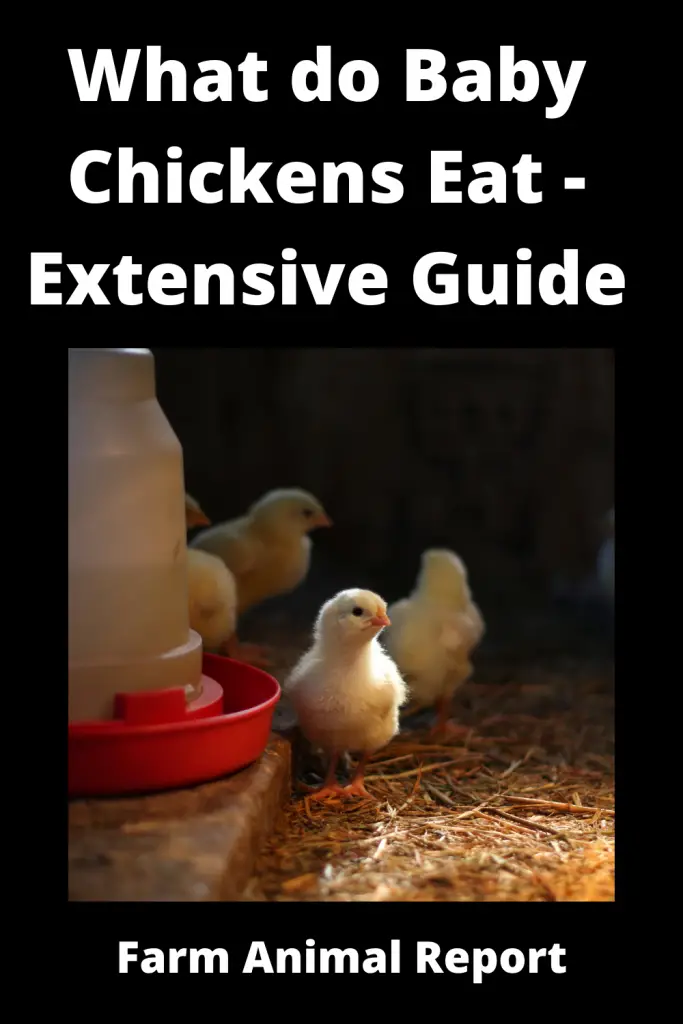
What do Baby Chicks eat when they Hatch?
When baby chicks hatch, they eat the yolk as well as the membrane of their eggshell, which provides them with a plethora of nutrients! The baby chickens don’t need to be fed again for 1-2 days after hatching because they’ve already consumed their shell nutrients.
How much do Baby Chicks eat per Day?
Day-old chicks eat 14 gram or 0.5 ounces of feed per day until a week. After one week, their feed increases up to 19-20 grams a day.
What can Baby Chicks have for Treats?
Because the chick’s digestive system is still developing, be cautious about what you give them. It’s all too simple to disturb their stomachs and cause some issues.
We usually begin with a hard-boiled egg, sliced into small bits or sweetcorn, cut similarly fine. They regard it as a murderous monster at first, but they consume it in seconds once they taste it. And no, they won’t transform into egg-eaters afterward! Consider this: a hard-boiled egg does not resemble a fresh, uncooked egg in appearance, fragrance, or flavor.
Another treat we give the chicks is lettuce, which I hang from the edges of the brooder box as a boredom-buster as well as a treat. Pecking at it will keep you entertained for hours!
What Can Baby Chickens Not Eat?
So here are the five foods your chickens should never eat:
1. Never, ever feed dried or Uncooked Beans to your hens.
In adults, dried beans have been known to cause significant sickness and even death. They are always fatal to chickens. The worst offenders are kidney beans, but any bean that has not been adequately cooked is potentially fatal to your chickens.
What exactly is the issue?
Phytohaemagglutinin, a toxin found in beans, is always lethal to chickens. Illness can develop after eating as little as three or four beans, and it spreads quickly, dying in as little as an hour.
How to avoid it?
They’ll probably avoid them anyway, but keep any bean plants out of the path of your chickens to be careful.
Any beans you offer your chickens should be adequately cooked. Soaking alone, as well as cooking in a crockpot or slow cooker, is insufficient. The poisons aren’t deactivated since the temperatures aren’t high enough. It’s also not a good idea to sprout dry beans. Sprouting lentils are nutritious seeds with no risk of toxicity.
Beans should be soaked in cold water for at least five hours, ideally longer, to make them safe for humans and chickens. Then, drain the water, properly rinse the beans, and quickly boil in fresh water for at least thirty minutes. They can be used in any recipe or fed to your hens once cooked.
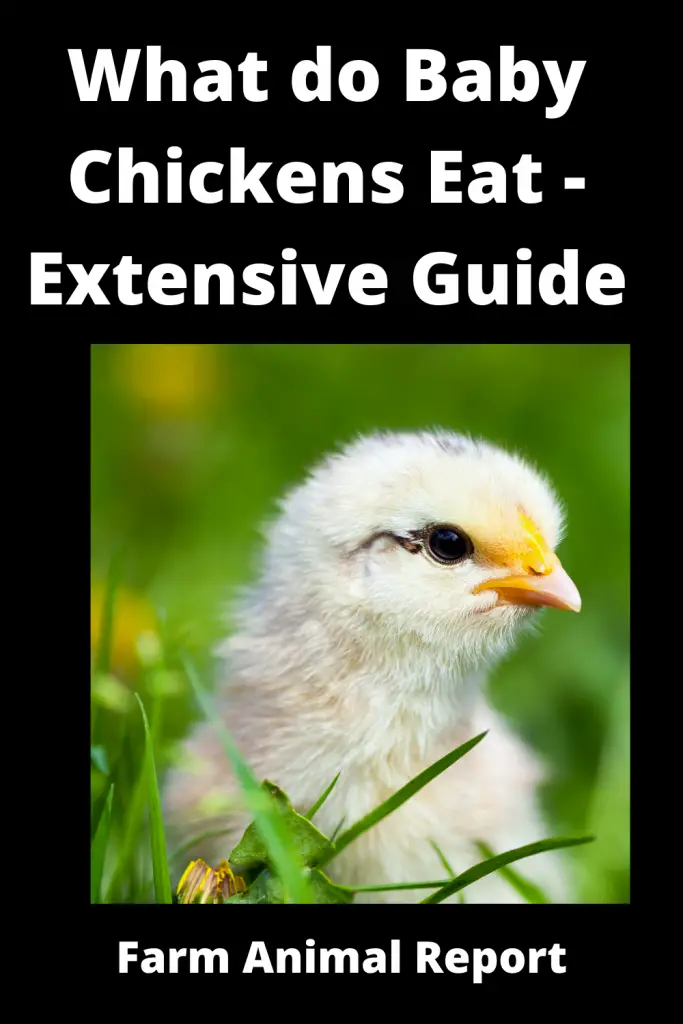
2. Never give moldy food to chickens.
Of course, certain molds are beneficial, but some are harmful. For example, Aspergillus flavus, a mold that grows on almonds, corn, and apples, produces aflatoxin, leading to liver cancer development in both people and animals.
How to avoid it?
Said, don’t give your chickens any food that shows signs of mold or is rotting in any manner.
It’s also crucial to avoid allowing your flock’s feed to grow moist, as this is one of the conditions that molds and their poisons thrive in. Keep in mind that moldy feed might be fatal.
3. Chickens should not eat parts of the Avocado.
Avocado is a contentious fruit. You’ll find information on the internet that states unequivocally that avocados are hazardous to chickens as a whole.
That isn’t entirely correct.
Chickens are particularly vulnerable to the toxin persin, which is contained by the avocado. Persin, at large dosages, causes heart problems in birds, followed by respiratory issues. It has the potential to kill you in less than 48 hours. Persin is mainly found in the avocado’s peel and stone (and the bark and leaves of the tree, if you happen to have one). Persin levels in the flesh are reduced, but it still exists since persin is fat-soluble and leaches into the meat from the stone.
How to avoid it?
Avocado is a good source of iron, potassium, and Omega-3 fatty acids, among other nutrients. However, it would help if you weighed this against the fact that it contains poisons that could be fatal to hens.
If you want your chickens to eat avocado, only offer them the flesh, and even then, only in small amounts.
4. Green Potatoes and Green Tomatoes should not be Fed to Chickens.
Mashed potatoes are a favorite of most chickens. They’d devour it till it was gone entirely from their tiny chicken ears. It will help if you feed them sparingly. Leftover cooked potato (including potato skins) is OK for chickens to consume, but it’s not one of the best treats because it’s low in nutrients.
Green Potatoes, on the other hand, are a different story
Green potatoes and green tomatoes contain poisons termed solanine and chaconine, which can be detected in the skin, flesh, and sprouts. Green potato parts, as well as unripened green tomatoes, are harmful to your chickens.
Cooking does not affect solanine, so don’t expect your flock to be alright if you boil some green potatoes. It isn’t going to happen. It will make you tired, paralyze you, and eventually kill you.
How to avoid it?
When potatoes are exposed to light, they become green, storing them in an excellent, dark spot. If you come across any leftover potatoes that have turned green or sprouted, do not feed them to your chickens, even if they have been cooked. Also, if your chicks have access to the compost heap, don’t dump green peelings on it.
5. Chickens should not consume Chocolate.
Chocolate is recognized to be toxic to various mammals, particularly dogs and cats, these days. Chocolate contains the poisonous chemicals theobromine and caffeine, which can also be present in multiple beverages such as coffee, tea, and colas. Theobromine is found in darker chocolates, which makes them more harmful.
Now, depending on how much chocolate is in the cake and how much they consume, a few pecks of chocolate or some leftover chocolate cake won’t do any harm to your hens.
However, even something as seemingly innocuous as a packet of chocolate chips can be lethal. Chocolate has been linked to heart abnormalities in birds, ranging from irregular heartbeats to complete cardiac collapse. Death will occur soon – within 24 hours of consuming the chocolate. So don’t use “compassion” to kill them. Keep the chocolate for yourself if you want to do your chickens and yourself a favor.
Feed your flock high-quality chicken feed, and if possible, let them range on pasture. Instead, give them some healthful snacks.
Can Baby Chickens eat Nightcrawlers, Apples, Watermelon?
Yes, baby chickens can eat nightcrawlers, apples, watermelon but in limit and moderation. As baby chicks stomach is not fully developed, so you should not overfeed them with these ingredients.
- Feeding nightcrawlers, such as earthworms or red worms, to grown hens is a beautiful idea. Mealworms, on the other hand, are a different storey. Red Wiggler worms are not only excellent composting worms but they may also be fed to animals as a high-protein, nutrient-dense meal (i.e., chicken feed).
- Watermelons are an excellent way for hens to satisfy their thirst, especially during the hot summer months. Chickens enjoy watermelons just as much as humans do. Watermelons contain 92 percent water, which will help your chickens stay hydrated.
- Apples are a favourite of chickens, and the peels and flesh are healthful rewards. Apples are high in vitamins, minerals, pectin, and amino acids. Except for raw green peels (such as green potato peel) and citric fruits like oranges and lemons, you can feed chickens almost any vegetable or fruit.
Health Problems Associated with feed for Baby Chickens?
There are many health problems associated with feed for baby chickens, such as:
- In the feed sector, mycotoxins are becoming a severe problem. Moulds in animal diets produce mycotoxins, which are harmful substances. Even if the mould is removed, the mycotoxin is often left behind.
- A lack or imbalance of circulating calcium, vitamin D3, or phosphorus causes Rickets. When essential nutrients are out of balance or the diet is low, illness results are expected. Some drugs and mould toxins can also cause Rickets. Soft bones develop due to the illness, which typically becomes bowed, limiting the birds’ ability to stand and move.
- Caged layer fatigue (CLF) was first noticed in the mid-twentieth century, shortly after layer manufacturers started housing laying hens in cages. Even though is laying hen feeds are designed to be nutritionally balanced, CLF is a nutritional disorder that is a leading cause of death in caged laying hens. This ailment is most common in birds around the time of peak egg production, and it may be linked to osteoporosis, a bone disease that causes brittleness.
- Fatty liver syndrome (FLS) is one of the most common metabolic illnesses in laying hens during high-production times. It was first identified in the 1950s as a condition characterized by excessive fat in the liver and variable degrees of bleeding. The exact aetiology of the sickness is unknown, although the first indicator is usually a rise in flock mortality.
Vitamins for Baby Chicks
One of the most prevalent problems with backyard flocks is inadequate or insufficient feeding, leading to vitamin and mineral deficits in the birds. Vitamins and minerals are essential components of a chicken’s diet, and deficits are likely to emerge unless you give a properly balanced diet.
Except for vitamin C, all known vitamins are required for a baby chick. Some vitamins are fat-soluble, whereas others are water-soluble. The following are some of the signs and symptoms of a vitamin deficiency:
Role of Fat-Soluble Vitamins for Chickens
• Vitamin A: Its deficiency causes decreased egg production, frailty, and stunted growth.
• Vitamin D: Its deficiency causes thin-shelled eggs, decreased egg output, stunted growth, and Rickets.
• Vitamin E: Its deficiency causes enlargement of the hocks and encephalomalacia (crazy chick disease)
• Vitamin K: Long-term blood clotting, intramuscular bleeding are all symptoms of vitamin K deficiency.
Role of Water Soluble Vitamins in Chickens
• Thiamine (B1): Its deficiency lead to appetite loss and death
• Curly-toe paralysis, poor development, and inadequate egg production are all symptoms of riboflavin deficiency (B2).
• Dermatitis and sores on the mouth and foot are caused by pantothenic acid (B5) deficiency.
• Bowed legs, irritation of the tongue and oral cavity are all symptoms of niacin deficiency.
• Choline deficiency causes poor development, fatty liver, and reduced egg production.
• Anaemia, poor development, and embryonic death are all symptoms of a lack of vitamin B12.
• Poor development, anaemia, poor feathering, and egg production are symptoms of a lack of folic acid.
• Biotin deficiency Dermatitis on the feet, around the eyes, and on the beak
As previously stated, vitamin deficiencies in hens can cause various health issues, including death in rare situations. Feeding a balanced poultry diet with the appropriate vitamins and minerals should be practiced to prevent nutritional deficiencies or when deficiency symptoms are noticed.
Vaccinations for Baby Chicks
Your chick must get a vaccination for these diseases:
- Marek’s Disease (vaccine immediately after bringing chick)
- Newcastle Disease/Infectious Bronchitis (between 14-21 days)
When a chick gets adult, you should vaccinate him against these diseases:
- Infectious Bursal Disease (between 14-21 days)
- Fowlpox (between 10-12 week)
- Avian Encephalomyelitis (between 10-15 week)
- Laryngotracheitis (between 10-12 week)
Final Thoughts
You must purchase the proper nutritional feed for your baby chicks. Please don’t feed them the same food as your adult flock: it’s too high in calcium, which can cause lasting kidney damage, and too low in protein, which chicks require to grow at such a rapid rate.
The ingredients in commercially made starting feed are carefully calibrated to provide just what a chick need. Look for a high-protein brand that is organic and non-GMO and has between 15% and 20% protein. Also, see if it’s been bulked up with soy and maize. If possible, choose unprocessed whole grain feed. It’s more natural, and it’s better for your chicken.
Your local feed store is the best and cheapest place to buy it, but you can order it online if you can’t get there for some reason. If you’re in the US, we recommend using any organic and guaranteed GMO-free brand that contains the proper amount of protein and is soy and corn-free.


